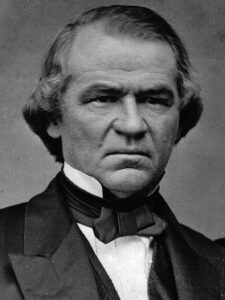» posted on Monday, July 1st, 2024 by Linda Lou Burton
#17. Johnson, Andrew
Linda Lou Burton posting from Little Rock, Arkansas – Andrew Johnson (December 29, 1808 – July 31, 1875) was the 17th president of the United States, from 1865 to 1869. If Abraham Lincoln was handed a can of worms on his first day as president, Andrew Johnson was gifted with a bucket of snakes on his. Angry, viperous snakes. Andrew had to step in for a president who had just been shot in the back of the head; a horrible, bloody death. Andrew was hastily sworn in as leader of a country that was plagued with the roaring disease of hate, as hundreds of thousands lay dead due to civil war. But Andrew accepted the job. Here was a man who was born to illiterate parents, had no formal education, and had been hiding out for days after making a public fool of himself as a blubbering drunk. He doesn’t get credit for much as a president, but I doubt the Angel Gabriel himself could have done any better. I want you to remember three words about Andrew – Greeneville, tailor, and alcohol. First I’m going to tell you some things about Tennessee, my home state for over twenty years. It’s a skinny horizontal piece of land, with the Mississippi delta to the west, a plateau in the middle where Nashville sits, and Appalachian Mountains to the east. Often called the “three states of Tennessee” it is a good example of the differences in our country at the beginning of the Civil War – the plantation lands that depended on slave labor to function; the hardscrabble mountains where folks tackled life in a vastly different way, and the middle ground, where politicians gathered to govern the whole batch of it.
Greeneville
Greeneville is tucked into the mountains of northeast Tennessee, an area that once was the State of Franklin – almost. It is important to the Andrew Johnson story because he moved there when he was 18, met and married Eliza McCardle (1810-1876) there, and is buried there today. If you understand Greeneville, it may help you understand Andrew Johnson. Back in 1784, folks in these isolated mountains decided they didn’t have much in common with the rest of North Carolina, so they’d just be their own state. A petition for statehood was drawn but rejected by Congress. They tried again; the first state legislature met in December in a crude log courthouse in Greeneville and prepared a constitution. However, the Franklin movement began to collapse and North Carolina remained in control until 1790, when it ceded the land to the federal government. In 1796, when Tennessee became a state, that little area just south of Virginia and just north of North Carolina wound up becoming part of Tennessee. But still remote, and still feeling independent.
Tailor
Andrew Johnson fell in love with Greeneville the first time he saw it. He loved it so much that later in life, when he had money enough to buy land, he bought the land he first camped on, and planted a tree right on the spot. I can understand that! Andrew was, literally, a “run-away slave.” In his birthplace town of Raleigh, North Carolina, his mother apprenticed him to a tailor when he was 10; he was legally bound to serve until he was 21. He did benefit in the five years before he ran away – he learned the art of tailoring, and he developed a lifelong love of learning. People coming into the tailor shop read aloud to the tailors as they worked and Andrew loved to listen. He ran away after five years though, and a reward was posted for his return. Andrew feared being captured; he lived in South Carolina for a while, fell in love, and along with a proposal, made a quilt for his intended. A quilt! His proposal was rejected, so Andrew moved west, trudging through the Blue Ridge Mountains to Greeneville, Tennessee.
On the day in September 1826 when Andrew arrived in Greeneville, he was spotted by Eliza McCardle, who was outdoors chatting with classmates from Rhea Academy. They instantly took a liking to each other, and were married the following May at her mother’s home – he was 18, she was 16. (Mordecai Lincoln, a distant relative of Abraham Lincoln, performed the ceremony. A portent?)
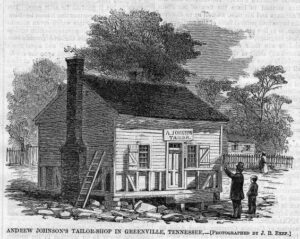 Eliza was better educated than Andrew; she tutored him patiently while he worked in the tailor shop he’d opened in the front part of their home. “My work never ripped or gave way” was the way Andrew promoted his business; the business was successful, and so was their marriage. Eliza supported his endeavors and together they had five children – Martha, 1828; Charles, 1830; Mary, 1832; Robert, 1834; and Andrew Jr 1852.
Eliza was better educated than Andrew; she tutored him patiently while he worked in the tailor shop he’d opened in the front part of their home. “My work never ripped or gave way” was the way Andrew promoted his business; the business was successful, and so was their marriage. Eliza supported his endeavors and together they had five children – Martha, 1828; Charles, 1830; Mary, 1832; Robert, 1834; and Andrew Jr 1852.
And Andrew got interested in politics, progressing over the next 45 years in this way:
Government Positions
- Served as Alderman of Greeneville, Tennessee, 1830-33
- Elected Mayor of Greeneville, Tennessee, 1834
- Member of Tennessee State Legislature, 1835-43
- Member of US House of Representatives, 1843-53
- Governor of Tennessee, 1853-57
- United States Senator, 1857-62
- Military Governor of Tennessee, 1862-65
- Vice President, 1865 (under Lincoln)
- 17th US President, 1865-1869
- United States Senator, 1875
Alcohol
Yes, Andrew was a stumbling, bumbling drunk during his inauguration as vice president on March 4, 1865. He rambled on for ten minutes past his allotted speaking time, forgot names, and didn’t sit down till somebody tugged on his coat. He claimed later that he had typhoid fever and the doctor had prescribed the medication. President Lincoln commented, in response to criticism of his new vice president’s behavior, “I have known Andy Johnson for many years; he made a bad slip the other day, but you need not be scared; Andy ain’t a drunkard.” Nevertheless, after briefly presiding over the Senate, Andrew hid from public ridicule at a friend’s home in Maryland.
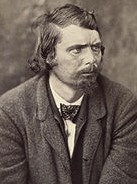 Alcohol may have embarrassed Andrew that day, but it saved him the very next month. You see, the plot to kill Abraham Lincoln included killing Andrew Johnson at the same time. George Atzerodt, a Prussian immigrant who owned a carriage repair shop in Maryland, met John Wilkes Booth in January 1865. And George agreed to kill Andrew Johnson on the night of April 14. That morning he booked a room at Kirkwood House, where Andrew was staying. But then he got cold feet, and spent the day at the hotel bar drinking. While Booth was taking care of business at the Ford Theater, George spent the night walking the streets of Washington in a drunken stupor, instead of killing Andrew Johnson. He admitted this in his trial which began May 1; he was hanged for his part in the conspiracy.
Alcohol may have embarrassed Andrew that day, but it saved him the very next month. You see, the plot to kill Abraham Lincoln included killing Andrew Johnson at the same time. George Atzerodt, a Prussian immigrant who owned a carriage repair shop in Maryland, met John Wilkes Booth in January 1865. And George agreed to kill Andrew Johnson on the night of April 14. That morning he booked a room at Kirkwood House, where Andrew was staying. But then he got cold feet, and spent the day at the hotel bar drinking. While Booth was taking care of business at the Ford Theater, George spent the night walking the streets of Washington in a drunken stupor, instead of killing Andrew Johnson. He admitted this in his trial which began May 1; he was hanged for his part in the conspiracy.
Three Little Words
So let’s say alcohol saved Andrew’s life for things he was destined to do. Let’s consider that his tailoring skills taught him how to piece scattered unmatched bits together into a useful whole (the quilt!) and to construct things that “never rip or give way.” Let’s add to that the strength that comes from growing up in a place where the very air he breathed was independent air. Maybe Andrew Johnson was the most qualified fellow to step in that day and try to pull the country back together. He gave it a shot. What would you have done? Would you invite this man to your party? I would.
Going Out
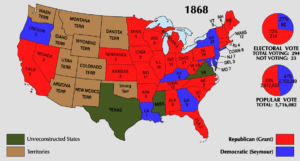 Andrew worked at it nonstop, but Andrew didn’t get invited back. Under his reign, the last battle was fought, all but three states were back in the Union — Virginia, Mississippi, and Texas – and reconstruction was well underway; Ulysses S Grant would shoulder that burden next. On Christmas Day 1868, Andrew issued a final amnesty, covering everyone, including Jefferson Davis; he also issued pardons for crimes. On his 60th birthday that December, Andrew threw a party for several hundred children – not including those of President-elect Grant, who said he would not allow his to go. On March 3, his last final day in office, Andrew hosted a large public reception at the White House. Grant had made it known he would not ride in the same carriage as the outgoing president, so Andrew refused to go to the inauguration at all. He headed for home.
Andrew worked at it nonstop, but Andrew didn’t get invited back. Under his reign, the last battle was fought, all but three states were back in the Union — Virginia, Mississippi, and Texas – and reconstruction was well underway; Ulysses S Grant would shoulder that burden next. On Christmas Day 1868, Andrew issued a final amnesty, covering everyone, including Jefferson Davis; he also issued pardons for crimes. On his 60th birthday that December, Andrew threw a party for several hundred children – not including those of President-elect Grant, who said he would not allow his to go. On March 3, his last final day in office, Andrew hosted a large public reception at the White House. Grant had made it known he would not ride in the same carriage as the outgoing president, so Andrew refused to go to the inauguration at all. He headed for home.
During his time away, both Union and Confederate armies often used his Greeneville home as a place to stay and rest during their travel. Confederate soldiers left graffiti on the walls expressing their displeasure; Andrew had to renovate his home after returning from Washington.
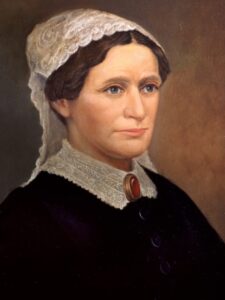 Eliza suffered from tuberculosis and had not been an active First Lady; those duties were handled by daughter Martha. Martha and her husband maintained a farm near Greeneville; she lived until 1901. Son Charles became a doctor; he remained loyal to the Union. He joined the Middle Tennessee Union Infantry as an assistant surgeon but was thrown from his horse and killed at age 33. Daughter Mary’s husband served as colonel of the Fourth Tennessee Union Infantry during the war; they also maintained a farm in Tennessee. Son Robert became a lawyer and politician; he was a Colonel in the First Tennessee Union Cavalry, and private secretary to his father during his tenure as president. He committed suicide at age 35. Andrew Jr founded the Greeneville Intelligencer, but died at age 26.
Eliza suffered from tuberculosis and had not been an active First Lady; those duties were handled by daughter Martha. Martha and her husband maintained a farm near Greeneville; she lived until 1901. Son Charles became a doctor; he remained loyal to the Union. He joined the Middle Tennessee Union Infantry as an assistant surgeon but was thrown from his horse and killed at age 33. Daughter Mary’s husband served as colonel of the Fourth Tennessee Union Infantry during the war; they also maintained a farm in Tennessee. Son Robert became a lawyer and politician; he was a Colonel in the First Tennessee Union Cavalry, and private secretary to his father during his tenure as president. He committed suicide at age 35. Andrew Jr founded the Greeneville Intelligencer, but died at age 26.
Andrew was elected to the Senate in 1875, making him the only former president to serve in the Senate. He died five months into his term, on July 31, 1875, at the age of 66. Eliza died the following January.
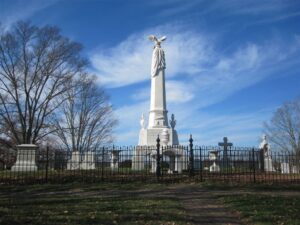 The Andrew Johnson National Historic Site is listed on the National Register of Historic Places. Properties include Johnson’s tailor shop at the corner of Depot Street and College Street. The site also maintains Johnson’s house on Main Street and the Andrew Johnson National Cemetery atop Monument Hill to the south.
The Andrew Johnson National Historic Site is listed on the National Register of Historic Places. Properties include Johnson’s tailor shop at the corner of Depot Street and College Street. The site also maintains Johnson’s house on Main Street and the Andrew Johnson National Cemetery atop Monument Hill to the south.

